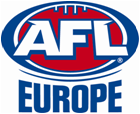Range of opinions in push for AFL Europe - part one
- Sunday, March 22 2009 @ 06:30 pm ACDT
- Contributed by: Brett Northey
- Views: 5,604


Late last year we posted the story AFL Europe proposed on a suggestion for the creation of AFL Europe and an associated true 18-a-side European Championships.
While the northern winter put footballs back in the cupboard until the snow melted, the concept of AFL Europe continued to be debated. Pinning down opinions on the record has been difficult, but the range of views has slowly become clearer.
In a series of articles we'll look at the shape the body may take and some of the views that have been expressed. At this stage it appears several of the larger European leagues are on side with the kind of proposal put forward by ARFLI and the AFL. Perhaps just as interesting is the more cautious view from one of Europe's middle leagues.
The following report includes content from both Aaron Richard and Brett Northey.
The Australian Football League Germany, who will point out their name refers to being a league playing Australian Football, rather than a filial of the AFL, have some views that probably place them between the two extremes of a straight yes or no to an AFL affiliated AFL Europe body being established. AFLG president Malte Schudlich spoke to us regarding his and the German league's views on how any future AFL Europe should be organised.
"There are two important roles of an European body: inside and outside representation and communication. Inside refers to organizing communication between its member leagues and clubs. One immediate task could be harmonizing the European leagues' fixtures in order to make international matches easier, especially within Europe".
"Outside refers to the body's task to represent its members' interests at all levels at least beyond the national level, i.e. the AFL, other European sporting bodies and other international football leagues".
"One big task is PR. European Australian Football needs one website that professionally presents European activity, most of all results, schedules, etc. This could be based on the Footy Record, which is an excellent database, but not very attractive for media or newcomers".
"Any roof organisation in the European sport system can only claim to represent its members if it is elected through a democratic process. I believe the body should start as an elected committee consisting of a certain number of representatives of each league, or club for countries without leagues. These reps will then have to construct a constitution upon which a board is elected to run the body".
"If the body fulfils the administrative tasks above, I am more than happy. Whether an European body could raise some funding in the near future, either from the AFL or from possible sponsorship, I don't know. Generally, I believe national bodies need to work harder within their own territories instead of waiting for the money to come from "above" (e.g. the AFL)".
We first got this feedback from Schudlich some months ago, but he stands by his comments. The exact role the AFL would play in the AFL Europe was also under discussion. Schudlich said "I believe we first need to establish an European body, and then negotiate our relationship with the AFL".
"Regarding a possible involvement with the AFL, I believe it is extremely important to keep the AFL out of an European body. One of the most important tasks of such a body will be representing us, and negotiating in our name with the AFL. Not in a hostile way, but with the understanding that such a body represents first of all our interests, which are not necessarily the AFL's".
"I would like to emphasise that my demand to keep the AFL out of the European body refers to the body's constitutional structure, not to the general relation between Europe and the AFL. This relationship needs to be negotiated on a different level. A European body can only act for and be held accountable by its European members".
The AFLG position would appear to desire a European body, but one that clearly is built by the member countries, for the member countries. This strong sense of independence has been present throughout Schudlich's tenure, and it's interesting to note that he did spend time in Melbourne working with the AFL some years ago - so the position is based upon a fundamental sense of the best way forward, not any sense of hostility.
However some of the other opinions in Europe see AFL inclusion and affiliation as worthwhile. We'll bring you further views in the next few days.


 RSS news
RSS news Twitter
Twitter Facebook
Facebook